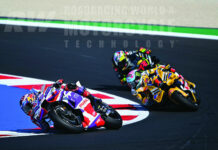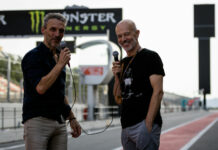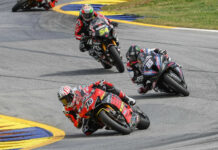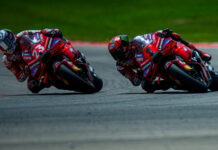From a press release issued by Team Suzuki:
For Australian Mat Mladin, the nine seasons he has spent racing in the highly-competitive American Superbike Championship has brought with it considerable success.
Since making the move to the AMA series in 1996, he has been associated with the factory Yoshimura Suzuki team for all bar one of those seasons, having raced for Eraldo Ferracci in his Fast By Ferracci Ducati team in 1997.
In this period he has emerged as one of the most decorated riders in the sport: Five AMA Superbike Championships, 32 career race wins including three Daytona 200’s and 37 career pole positions, which rates him as the best in the business.
Mladin and his tight knit crew has become the yardstick of the American Superbike Championship. His rivals see him as the man to beat. He has many fans as well as detractors, but that does not distract him from the task at hand – winning championships.
Fresh from his recent championship success, Mladin took time to answer a number of questions relating to his season and his time spent racing in the grueling AMA series.
With five AMA Superbike crowns to your credit, how do you rate this year’s title win?
MM: This year was a pretty tough championship. We were up against it, especially over the first two-thirds of the year. The motorcycle was a little behind due to the rule changes imposed after last season. As far as how hard it was, it definitely was hard. As far as how satisfying it was, it was the most satisfying by far.
You went into 2004 as the defending champion but were not rated as the pre-season favourite to take the title. How did that sit with you?
MM: You are probably right and all that was based on one off-season tyre test at Daytona when the Honda guys came out and went really fast. They put a good spin on the publicity there and that seemed to blow a lot of things out of proportion for what could have happened and I think it did.
You won the Daytona 200 for the third time this year and with the rule changes proposed by the AMA for 2005 (it will run as a Formula Extreme class) it could well be the last. What are your thoughts on that decision?
MM: I’d hate to say that it would be the last time that Superbikes race the Daytona 200 because who knows what they are going to have for the future and are they going to have to turn that decision around. Is it really going to be the last Superbike Daytona 200? I’m not really certain of that.
It’s very highly thought of by the manufacturers. Myself as a non-American racer, I don’t place as much importance on it as an American would. For me, it’s the first race of the championship and I don’t want to do anything silly there that would leave me catching up a whole heap of points.
Was there a particular high point for you this year?
MM: The two wins at the penultimate round at Road Atlanta were huge for us. That was a weekend where the championship could have either tightened way up for the final two races at Virginia, or we could essentially clinch it. Even though mathematically we couldn’t clinch it, we could put all of the competitors away at that race and that’s what happened. It made it extra special because there was that tension and pressure that was growing between Miguel DuHamel and myself and we came away with maximum points after taking pole and leading most laps in each race on the way to the two wins. It was a nice way to leave there.
Was it a turning point in the season, even though it was quite late?
MM: I don’t think it was a turning point as we led the whole season. Laguna Seca really stopped the bleeding for us after the few fast race tracks where we lost points to our rivals. Laguna stopped that for us and then we got a win at the following round at Mid-Ohio where we started to stretch the points out again. Then at Atlanta, we put it to bed.
When did you feel that the championship was yours to win?
MM: After Atlanta. We felt pretty comfortable and had over a race in points in the lead of the championship, so it would have taken a big mess up for us to lose it after that.
Has there been any one particular facet that would be the key to your success in America?
MM: The biggest thing was learning six or seven years ago that I needed a strong team to be able to win championships. It’s something that I really woke up to after my year with Eraldo Ferracci. You can’t win titles, especially consistently, without having a solid team who do the same every weekend.
How important has it been to have such a dedicated group of guys around you that form the nucleus of your team?
MM: My long time crew chief Peter Doyle and mechanic Reg O’Rourke have been joined by other members, Johnny Asher, Manny and Henry, but the key is that they are a really solid group that works extremely well together.
They all know what to do. At the track we get the job done and if we win, we go out and have dinner and some fun, but if we don’t, we still go out have dinner and some fun. That’s what it is all about.
How enjoyable has it been over the past two years where you have been able to race 1000cc multi-cylinder Superbikes?
MM: Last year, the Suzuki GSX-R1000 was by far the best motorcycle on the racetrack. Last year we won a lot of races reasonably comfortably and it was good to have won that fourth championship, but it certainly wasn’t as near as hard as this year. This year I’ve spoken about the motorcycle not being fast enough at times, but again, it all goes back to the rule changes that were implemented very late last year, so the motorcycle just wasn’t up to the same specification as the others we were racing against this year. Next year it will be, so we’ll see how it goes then.
How do rate the next crop of riders emerging in the US?
MM: There are a few guys over here doing very well. The Hayden brothers, Tommy and Roger Lee at Kawasaki – Tommy won the Supersport Championship, while there’s also a couple of younger guys over at Yamaha. Aaron Gobert did well in winning the Superstock championship while Jason Disalvo seems to be pretty fast. In my Yoshimura Suzuki team, Ben Spies will be stepping up to Superbike next year so we’ll see how he goes there.
Do you still have that desire for either GP or World Superbike or will you conclude you career in America?
MM: I’d imagine that I’d finish my racing career here in the US. The GP thing has always interested me since I was there in ’93, but certainly even less the more years that we go along because it is one of those things where you really do need the right package – bike and team – or else you are wasting your time. There are only so many factory bikes to go around and the unfortunate thing is that I’m unlikely to get one. Honda has already stated that it will only have two official factory bikes in MotoGP.
As for World Superbike, it just doesn’t interest me full stop. The level of racing I don’t think is that high. To have to travel around the world to say that you race in World Superbike does not appeal to me. I see it as a huge step backwards to what I’m doing here in America. The rules between SWC and the AMA may be slightly different, but the teams here still get the very latest equipment from the factories, so on that score this series is very strong.
To give you an idea, we had factory rider Regis Laconi race here at the final round last weekend straight after being a title contender in the SWC a week earlier and he couldn’t get within a second and a half a lap of our times. During the second race I had to do a stop-go for jumping the start and was still able to catch and beat him by over five seconds at the end of the race. The AMA is not an easy series by any stretch of the imagination.
You’ve spent nine year’s racing in America. You must enjoy the way of life you have created for yourself there?
MM: I love it here. There are so many things that I’ve been able to do because of my time here. My import company is directly attributed to the people I have been fortunate to deal with over here such as Yoshimura and Joe Rocket. My success over here with racing has led to some successful business ventures.
Not only that, but you do tend to live a fairly normal lifestyle where you live in your own house, go and race, then come back to it where you do normal type things. Things like that that I do enjoy.
Many may perceive your over-confidence to verge on arrogance. How do you read this with the positive nature it takes for anyone to win a championship title and where is the fine line?
MM: Personally I see it as a minority that would see it like that. You always have your detractors no matter who you are. Overall I think it is a minority. Some people see me that way, but I do have a lot of fans over here, I enjoy racing, I have a passion for it and finishing second doesn’t sit well with me. So when I lose, it’s annoying until I get to the next race and make amends for it. I like to perform at my best whatever it is – a bit like everyone I guess.
You are very vocal regarding track safety in America. Do you feel that you are being heard by those who make the decisions?
MM: When it comes to track safety, there’s never enough that can be done. You certainly like to see more done, but unfortunately it’s one of those areas that you keep pushing for and make more improvements, but things never seem to be quick enough. Certainly America doesn’t seem to have track safety as high a priority as the European countries are, especially the World Championship circuits.
However, a few have made steady changes over the years, which is great, but there are still a couple of places where the whole circuit is still terrible. I don’t know why we still race there, especially the speeds carried by the current crop of motorcycles.
What do you see in the future direction of Superbike?
MM: The current 1000cc Superbike is an excellent platform. I think they will always have a platform, as they are different to GP bikes. Horsepower figures are not that different between them. The current Superbikes are putting out well over 205hp, while the lead MotoGP machines are around 235 to 240hp.
There will always be a place for them as they are the bikes that people buy and therefore a huge marketing tool for the manufacturers, which is also the reason why they are all getting back into World Superbike next year.
What lies ahead contract wise for you?
MM: I’m done for 2005. I’ll be back to defend the title and see if we can make it six, but after that we have to see what happens. As long as I’m still enjoying it and have that fire in my belly I’d like to keep winning and I guess I’ll be doing it for a few more years yet.
Mladin: Key To Racing Success Is Having A Strong Team
Mladin: Key To Racing Success Is Having A Strong Team
© 2004, Roadracing World Publishing, Inc.






